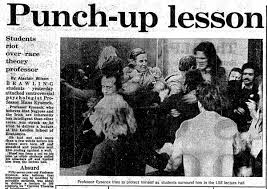
In the aftermath of World War II, certain ideas came to be blamed for the war, and so became extremely unfashionable. Anti-Semitism, supremacist nationalism and eugenics were among the foremost of these ideas. However, much like slavery after the American Civil War, some of these ideas just changed form rather than disappear.
When the Industrial Revolution swept over the Western World, it brought with it a godless kind of materialism. It taught us that the way to wealth and power was mastery of the material world and its laws, and that spirituality was merely a distraction. In the wake of this came an entirely new set of moral values that had not previously existed.
One of these new moral values was the idea of productivity. This meant that the people who did more work for their masters were prized higher than those who did less. This idea of productivity meant that the world became divided into the deserving productive and the undeserving unproductive. The idea of getting rid of people who weren’t productive enough followed in short order.
Within a few hundred years, this latter idea had evolved into what was called eugenics. This is the deliberate effort to improve the genetic stock of the nation by encouraging the breeding of those considered to have good genes, and discouraging the breeding of those considered to have bad genes. The idea is that the lazy, dumb, infirm etc. will become fewer in number if those likely to produce them are coerced into breeding less.
The breeding restrictions that come with eugenics are motivated by a variety of reasons, but what those reasons boil down to is an appeal to the greater good. Usually this means that the continued existence of the person killed would have been a detriment to the greater good because of the waste of the resources necessary to keep them alive. Sometimes it is suggested that it’s cruel to keep people alive when they appear to be suffering.
Although the idea of eugenics is most typically associated with the Rassenhygiene of Germany before and during World War II, the idea was first popularised in America just after World War I. Adolf Hitler even referenced the work of Americans such as Margaret Sanger as an example of how Germany ought to carry out eugenics programs against their own population.
In Germany, the Aktion T4 program saw the sterilisation, and then the extermination, of several hundred thousand people who were deemed to be either physically or mentally defective. This occurred in a variety of ways, from lethal injection to gas chambers (the idea of exterminating people in gas chambers was first thought up for use on schizophrenics).
This approach can be described as hard eugenics. This is when the Government kills you outright.
As mentioned above, hard eugenics became extremely unfashionable thanks to the German loss in World War II. But the desire of the ruling classes to commit eugenics on their populations did not go away. The fundamental desire to be in charge of a productive population, rather than an unproductive one, didn’t change.
It was observed, after hard eugenics became unfashionable, that the people who had been slated for extermination all had one quality in common: they were poor. Being mentally or physically infirm makes it all but impossible for one to trade one’s labour for a decent wage. In all but the most exceptional cases, it guarantees a life of impoverishment on society’s fringes.
Therefore, it was possible to institute measures that didn’t directly kill people, but which made their lives so miserable that they killed themselves. All that was necessary was to institute measures that made it hard to be poor. The modern way to do this is by applying constant stress over housing, healthcare and job security.
Soft eugenics, then, is when the Government makes your life so shit that you either kill yourself or withdraw from attempting to reproduce.
Like hard eugenics, this is also achieved in a variety of ways, although the fundamental element to it is the weaponisation of despair. Life is made to appear so hopeless, so meaningless and so pointless, that withdrawal from it seems like the only reasonable option. Despair is used as a weapon, to drive people whose survival is already marginal to suicide.
This has the same eugenic effect as hard eugenics without all the drama.
Soft eugenics has become so fashionable today that average life expectancy is now starting to decrease in America. This decrease is because of the sharp increase in what are called “deaths of despair”. Many of these deaths are suicides by gunshot, and many are quasi-suicides in the form of opiate overdoses. Their common factor is a person who gave up on life.
Making people give up on life is how soft eugenics works. This is primarily achieved by paying shitty wages, so that workers are always in a state of financial precarity. It’s also achieved by destroying communities through mass immigration, so that no-one knows their neighbours. A further tactic is a democratic political system that transparently doesn’t give a fuck about anything other than lobbyist dollars.
The tendency to give up on life is accelerated by a popular culture that only permits discussion of the lowest common denominator of thought. In our current society, anyone who thinks for themselves will be ostracised to such a degree that proper human function becomes very difficult. It’s only permissible to march in lockstep with the hordes of morons – the alternative is to get bullied towards suicide.
Political correctness plays its part in soft eugenics, especially nowadays. The more politically correct a society becomes, the greater the cognitive resources that each individual member of it must devote to self-policing. This means fewer cognitive resources left over for actually living. Therefore, the more politically correct a society is, the more heavily it practises soft eugenics.
Cannabis prohibition has been a central plank in governmental efforts to get the more vulnerable elements of their populations to kill themselves. Many people on the margins have found that cannabis is an essential tool for dealing with the depression that comes with a tough life. Making it harder to get hold of this medicine only serves to push vulnerable people towards suicide. This is the plan.
In the case of New Zealand, we do not practice hard eugenics but the practice of soft eugenics is very strong. New Zealand is a paradise for the wealthy, but a hell for the poor. Our practice of soft eugenics is taken to an extreme degree here, which is why we have the highest youth mortality rate in the entire OECD, even ahead of places like Mexico and Turkey.
We no longer kill the mentally and physically infirm – now we just make their lives so shit that they kill themselves. Because we’re not directly responsible for the suicides, we can claim that it isn’t a form of eugenics. But it is – it’s just a softer form of what the Nazis did.
*
If you enjoyed reading this essay, you can get a compilation of the Best VJMP Essays and Articles of 2018 from Amazon for Kindle or Amazon for CreateSpace (for international readers), or TradeMe (for Kiwis). A compilation of the Best VJMP Essays and Articles of 2017 is also available.
*
If you would like to support our work in other ways, please consider subscribing to our SubscribeStar fund.






